First Focus sent a letter to Republicans and Democrats in House and Senate leadership today asking them to answer a few important, but largely ignored questions in the health care debate to “repeal and replace” the Affordable Care Act (ACA). We have asked them to request critical information from the non-partisan Congressional Budget Office (CBO) in order to, at the very least, be informed about whether the House bill, the American Health Care Act (AHCA), can answer this overarching question: “Is it good for the children?”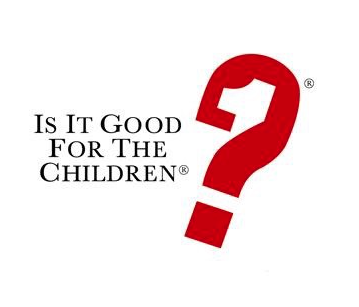
When the AHCA was passed out of the House Energy and Commerce and House Ways and Means Committees, the CBO published an analysis that provided some important information about how the bill would impact our nation’s health care system.
First, CBO estimated that the bill would increase the nation’s uninsured rate from an estimated 28 million to 52 million, which is an astounding 86 percent increase in the nation’s uninsured rate by 2026.
CBO also informed us that the AHCA would have cut $880 billion out of Medicaid and dropped 14 million low-income children, adults, people with disabilities, and senior citizens from coverage. The analysis also provided some information related to how another 10 million would likely lose coverage through a reduction in the subsidies provided for in the AHCA and in employer coverage.
However, what has been missing from CBO’s estimates are details related to how children would be impacted. For example, look at Figure 2 from the CBO analysis, which breaks down the percentage increase in the uninsured for all other age groups (19–29, 30–49, and 50–64).
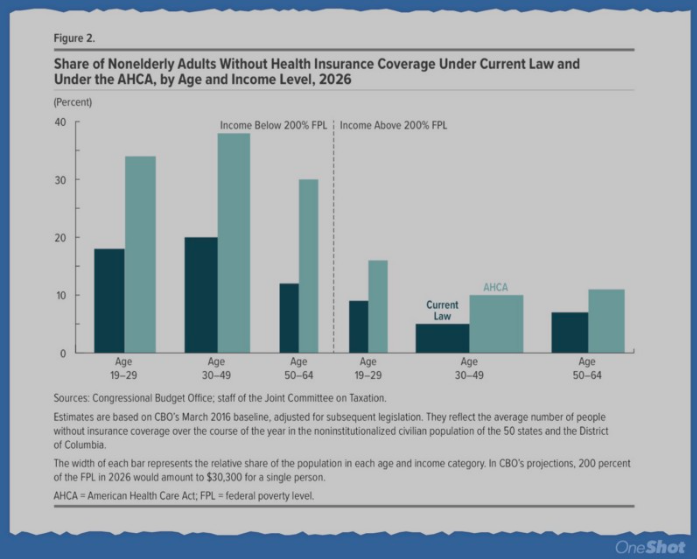
The chart begs the obvious question: “What about the children?”
CBO also gave a detailed analysis of the impact that the changes in the tax subsidies or credits in the AHCA would have on individuals with specific analysis on those who are 21, 40, and 64 years old (see Table 4). Once again, CBO had to go out of their way to avoid providing information on the impact of the AHCA on family coverage generally or children’s coverage specifically.
While we were left in the dark by CBO as to how children would fare in the initial draft, things only got worse.
Subsequent to the committee votes, House leadership proposed a “Manager’s Amendment” that would have made significant changes to the bill. Those changes, as adopted by the House Rules Committee, would have adjusted the bill’s Medicaid per capita cap for just people with disabilities and senior citizens, added a work requirement to Medicaid, and created a new block grant option for states for just children and adults.
According to a document released by the House Ways and Means Committee, “Recognizing the unique needs of the elderly and disabled, the amendment increases the annual inflation rate for the elderly and disabled Medicaid populations. This ensures that Medicaid spending on our most vulnerable more accurately reflects shifting demographics due to the aging of the Baby Boomers and the practical challenges of high-fixed costs for this vulnerable population.”
Although $839 billion in overall cuts to Medicaid will still create enormous problems for everybody served in Medicaid, including people with disabilities and senior citizens, it is disturbing that children were completely ignored — once again. This is despite the fact evidence and projections from both the Medicaid and CHIP Payment and Access Commission (MACPAC) and the Centers for Medicare and Medicaid Services (CMS) show that children will actually have higher growth rates in the future.
For example, according to MACPAC in its June 2016 report to Congress, the estimated annual growth rate for children (4.8 percent) is actually expected to rise about half-a-percentage-point faster than for people with disabilities (4.2 percent) and seniors (4.3 percent) between 2014–2023, but their inflation adjustment under the per capita cap will be a full percentage-point lower in the Medicaid per capita cap.
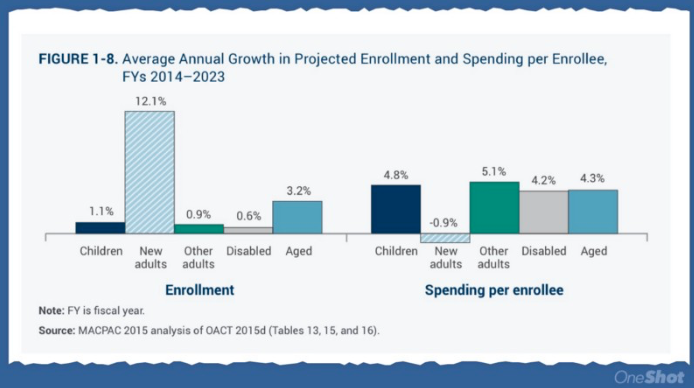
Furthermore, another provision was added to allow states to take up a Medicaid block grant option with yet an even lower inflation rate and no population growth adjustment at all. As a summary to the Manager’s Amendment explains, “The [block] grant would only apply to traditional adult and children Medicaid populations, with funding for elderly and disabled populations calculated through a per capita allotment.”
In this case, children were not ignored. Instead, they were specifically targeted for additional cuts. In addition to receiving an inflation adjustment that only half the rate that MACPAC estimates is needed, the federal government would deny additional funding for population growth for children.
In light of this, it is important to highlight that there are over 4 million children born in the United States annually. Two years ago, former House Republican Whip Eric Cantor (R-VA) called upon Congress to pay particular attention to their needs. Cantor wrote:
The block grant option would do the opposite. For those newborns that would otherwise be eligible for Medicaid, the federal government would, in a sense, no longer be providing financial support for their care.
Compounding these cuts to children’s health in Medicaid, the Manager’s Amendment also provides states with the ability to cut 30 percent out of their contribution to Medicaid coverage under the block grant option. This would be devastating to children, but goes unmentioned (and may not have even been considered) by the CBO. For children, states would be put in the position of rationing their coverage, benefits, and care.
Subsequent to that, additional changes have been proposed in the House to the AHCA that would eliminate the guarantee to essential health benefits, coverage of people with pre-existing conditions, and protections against annual or lifetime limits, but we have seen no additional information from CBO on their impact as of yet.
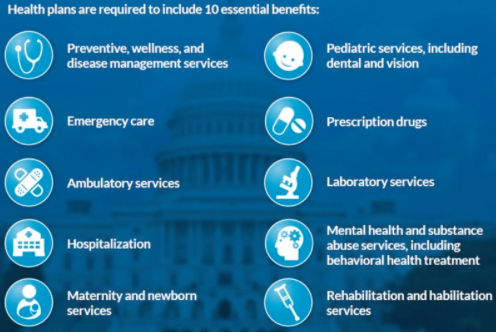
The children’s advocacy community has repeatedly tried to sound the alarm, but to no avail. We have collectively called upon Congress to “do no harm” to children in their consideration of any legislative changes to our nation’s health care system.
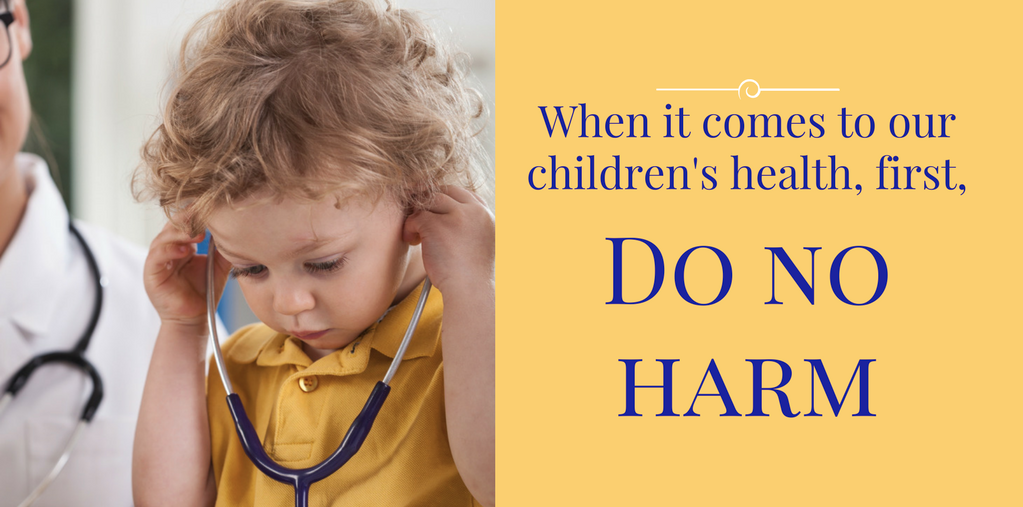
However, children have been largely ignored in this debate, until Jimmy Kimmel made it real.
And yet, sadly, the House appears to be willing to take action without even the data or information that CBO should be providing them with respect to children, who are one-quarter of our population and all of our future.
Consequently, First Focus wrote today’s letter to Republicans and Democrats in House and Senate leadership asking them to request that CBO provide the Congress important information about how the initial legislation, the Manager’s Amendment, and now additional proposed amendments would impact the health of children.
The letter includes a number of questions that every Member of Congress should have answers to before they cast any further votes on the legislation. In fact, having voted repeatedly in the past to require that children take a number of tests in the name of education accountability, shouldn’t they themselves have, at the very least, some basic knowledge themselves before they take action and pass legislation that can have enormous consequences upon the health and well-being of millions of our nation’s children?
